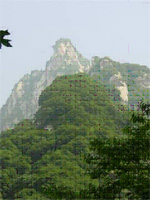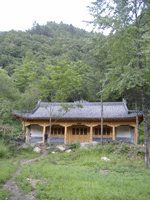|
|
|
|
 |
|
July 2006 Daoism and Conservation workshop
 |
 |
 |
Daoist sacred mountain of Taibaishan |
The inaugural workshop on Daoism and Conservation at Taibaishan Ecological Temple was attended by 14 monks, representing 10 Daoist temples from Shaanxi and Gansu provinces alongside representatives from ARC, the Shaanxi Academy of Social Science, the Taibaishan National Nature Reserve, the Development of Western China Magazine, the Xi’an Black River Forest Park, Local Environmental NGOs and local government departments.
The programme, which culminated in the Qinling Declaration made between all Daoist participants, included the following discussions:
Traditional Practice vs Current Issues
Professor Fan Guangchun of Shaanxi Academy of Social Science gave a vivid presentation on how Daoist temples in Northwest China have traditionally acted positively to protect the ecology of their area. He also addressed some of the problems these temples are currently facing. He showed photographs taken during his fieldwork, which were made into ten posters to be used in future workshops and events.
 |
 |
 |
Tiejieshu Ecological Daoist Temple, built in 2006 |
A Daoist Monk describes his own reawakening
Master Ren then told his personal story of the building of Tiejieshu Ecological Daoist Temple. He said the whole process really awakened him to the role of Daoism in environmental issues. “It made me think quite differently about the environment, and how we, as Daoist monks, can protect it,” he said. He urged the 13 other Daoist monks present to be aware of the role of Daoists in today’s environmental protection practice, and to bring this message back to their temples.
Sacred Mountains
ARC’s China-based consultant Peter Zhao gave a presentation on ARC’s work in protecting Chinese Sacred mountains. He suggested improving relationships between Daoist temples and administration departments of the nearby reserve areas, and linking environmental activities with Daoist ceremonies and affairs.
Choose a number from 1 to 10...
ARC’s consultant Dr He Xiaoxing gave two presentations, which are both available for reading in Chinese in our Downloads section. The first presentation covered basic environmental concepts and issues, giving examples from Mongolia (Buddhists) and Mexico (Christians) of how other faiths have tackled similar issues. The second presentation encouraged Daoist monks and nuns to bring the environmental message home to their own temples. At the end she asked each monk and nun to choose a number from 1 to 10 (1 meaning bad/no, 10 meaning excellent/yes) – and hold it in their heart to evaluate how well his or hers temple did on the following environmental issues:
1. How have environmental sustainability issues been expressed in your prayers and ceremonies?
2. Does your temple own farmed land? If yes, is the land farmed ecologically and organically?
3. Is your temple on a sacred mountain? If yes, have you helped protect it – for example by creating tree nurseries or by clearing rubbish from the hillsides?
4. Does your temple use recyclable paper? Do you have any recycling facilities?
5. What kind of energy do you use? Do you have an energy saving policy?
6. Where does your drinking water come from? Is your drinking water from the nearby river? Are there any watercourses near your temple?
7. Does your temple have any financial share-holding investments? If so, have you ever thought about whether they are chosen ethically so they do not have negative effects on the environment?
Dr He suggested key actions to improve their totals, including introducing environmental education into their religious activities, considering sustainable landuse, paying attention to surrounding deforestation; having waste facilities, saving electrical energy, protecting watercourses and considering investments. She also raised the issue about making sure Traditional Chinese Medicine practices and ingredients do not threaten rare and endangered species..
The workshop took place in the Panda House beside the Qinlin Tiabaishan TieJieshu Ecological Daoist Temple. It was hosted by Louguantai Daoist Academy with support from ARC, Ecological Management Foundation (EMF), WWF International, the Daoism research centre of Shaanxi Academy of Social Sciences, the Development of Western China Magazine and the Xi’an Black River Forest Park.
Ms Ye Guangqin, well-known author and vice chairwomen of the Literature Union of Xian city was specially invited for an opening speech. Other opening speeches were given by Vice president of Shaanxi Daoist Association Master Yuan Xinshen, Vice president of Gansu Daoist Association, Master Yuan Chongshan, Deputy Director of Development of Western ChinaMagazine Ms Liu Hongxia and Vice president of Religious Bureau of Zhouzhi county, Mr Tian Zhifeng.
LINKS TO TALKS (in Chinese):
Professor Fan Guiching: 西北道教生态保护实例展示
Peter Zhao: ARC对中国宗教发展和圣地管理的一些思考
Dr He Xiaoxing: 环境保护的意念和项目
Dr He Xiaoxing: 古老智慧和新角色:道教和环境保护
Master Ren: 主讲人:楼观台道观 任兴之道长
|
 |
|
|
|
|
|
 |
Daoist Ecology Centre
In July 2006, ARC launched a significant new development to protect the sacred mountain of Taibaishan |
 |
August 22, 2006:
Daoists pledge to protect sacred landscapes
Last month Daoist monks and nuns representing ten major temples in Shaanxi and Gansu provinces declared formally that they would protect the environment around their sacred lands and buildings. |
 |
July 25 2006:
Major Religion and Development Conference scheduled for Oslo
The Norwegian government is working with ARC, UNDP and the World Bank to host a conference to help encourage - and maintain - strategic partnerships between faiths, governments and major funders.
|
 |
 |
|
|

